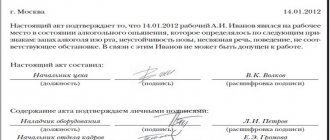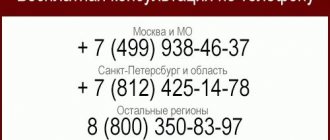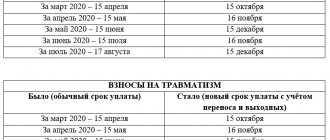Author of the article: Yulia Kaysina Last modified: January 2020 1747
According to Art. 21 of the Labor Code, an employee must not only fulfill his job duties, but also observe labor discipline. If an employee refuses to do this, the employer has the right to fire him. Depending on the severity of the offense and specific circumstances, dismissal for violation of labor discipline may follow even after a single failure to comply with norms and rules.
Labor discipline
Labor discipline is understood as the main part of the work process. This is a set of rules of behavior and norms governing the relationship between an employee and an employer. If the team does not obey the established rules, a full-fledged work process will not work.
All principles are usually regulated and fixed in an employment contract. And for non-compliance with discipline, various fines and sanctions are provided. These include dismissal as a harsh measure in case of violation of discipline.
Based on what article is dismissal for violation of labor discipline based? Article 81, paragraph 6, is usually applied when an entry is made in the work book, and Art. 192 regulates disciplinary sanctions for violation or failure to fulfill duties.
https://youtu.be/q86JvULFFXQ
Which article of the Labor Code describes dismissal for violation of labor discipline?
The Labor Code allows the employer to dismiss for violation of discipline under paragraphs 5-11 of Article 81 (“Termination of an employment contract at the initiative of the manager”). Each section of this document is devoted to specific issues.
Legal dismissal will take place for the following reasons:
| Article of the Labor Code | Decoding |
| Paragraph five prohibits repeated violation of labor duties | Two disciplinary sanctions for misconduct or more (reprimands, reprimands). |
| Point six describes a one-time but gross violation | Gross violation of labor order. It means absenteeism, appearing at work while drunk, an act of corruption, disclosure of state secrets, official or commercial information. |
| Point seven concerns unjust enrichment, conflict of interest | Violation by a financially responsible person of the legal order for the distribution of material and financial benefits. Such actions lead to a loss of trust on the part of the employer. For employees of municipal and state authorities - incomplete or unreliable provision of information on income and expenses, concealment of accounts and property. |
| Paragraph eight, valid for educators and teachers | Immoral behavior in children's (educational) and school (educational) institutions. |
| Point nine, designed for financiers | For the theft of financial assets from an enterprise's account, the actions of accountants in this case cause damage to the enterprise. |
| Point ten, only for managers. | One-time gross violation of labor duties by the boss or his deputy. |
| Point eleven, for specialists who have recently been hired by the enterprise. | For forgery when applying for a job, when presenting “purchased” diplomas, when providing false information. |
Read what a citizenship certificate looks like. Where to complain about illegal redevelopment of an apartment? Who is responsible for this? The answer is here.
Employee Responsibilities
According to legal regulations, an employee is obliged to:
- Perform your duties at the proper level.
- Adhere to labor standards and discipline.
- Maintain safety at work.
- Protect the organization's property and keep trade secrets.
- If there is a threat to the health of other employees, notify management.
If an employee ignores at least one of the above points, this can be considered a violation of internal regulations, which, in turn, leads to punishment. The most extreme measure is dismissal for violation of labor discipline. At the same time, before dismissing an employee, you need to prove his guilt.
Reasons
In order to dismiss an employee under this article, the employer must have compelling reasons.
An article of the Labor Code of the Russian Federation regulates dismissal for violation of labor discipline. What article? Usually they resort to Article 81, which spell out specific reasons on the basis of which an employee can be punished.
These include:
- theft, embezzlement and other crimes in the organization;
- negligent attitude towards the manager’s property or its theft;
- amoral behavior;
- showing up at work under the influence of alcohol or drugs;
- absence from work for more than three hours in a row;
- one-time or continuous failure to fulfill one’s duties;
- availability of warnings and penalties for such violations.
Responsibility for violation
The employer may, depending on the severity of the violation, apply various types of punishment: from a reprimand or reprimand to dismissal.
The first two cases are not included in the labor report, but the fact itself must be recorded using an act. A reprimand or remark does not threaten an employee with anything terrible if it happened only once. But if misconduct leads to repeated reprimands, then the employer may resort to a harsh measure - this is dismissal for violation of labor discipline.
In any case, no matter what punishment follows, the employee must draw up an explanatory note within a few days. The employer draws up a report based on this document. If an employee disagrees with these facts, he can appeal them and prove his innocence. As a last resort, you can go to court.
Dismissal procedure
If, nevertheless, the employer believes that dismissal for violation of labor discipline is the only way out, several steps should be followed:
- Evidence of a violation. This stage is considered one of the most important, and it must be documented only in writing. You can arrange an examination in several ways: through an examination (if the employee is drunk) and by drawing up a protocol. You can also attach a video recording as evidence. The employer must remember that the absence of specific facts may serve as a reason for reinstatement of the employee through the court.
- Warning. If for an employer an employee is a valuable resource, but it turns out that discipline has been violated for some reason, you can get by with a warning (but this also cannot be abused; the employee can sit on the neck).
- Familiarization. If the employee nevertheless committed a crime and all the evidence against him has been collected, then the employer must prepare an order for disciplinary action, which the employee must familiarize himself with under signature. If an employee refuses to sign for familiarization with the document, an appropriate act must be drawn up in the presence of witnesses.
- Receiving an explanatory note. An explanation from the offending employee is also an important part of the dismissal process. For example, if delays occur systematically, an explanatory statement regarding this fact must be provided each time. The same applies to other cases when an employee violates the established procedure in the organization. An explanatory note can both help a citizen and establish the fact of a violation. Therefore, the employee must think about what he writes and in what form.
Gross violation of labor duties
For a gross one-time violation of labor duties, an employee can be dismissed on the basis of clause 6, part 1, art. 81 of the Labor Code of the Russian Federation. Moreover, it is possible to dismiss on this basis, including: women with children under three years of age; single mothers raising a child under 14 years of age (disabled child under 18 years of age); workers raising a child under 14 years of age (a disabled child under 18 years of age) without a mother. You can't just fire a pregnant woman. This is stated in Art. 261 of the Labor Code of the Russian Federation.
A single means :
- absenteeism, that is, absence from the workplace without good reason throughout the entire working day (shift), regardless of its duration, as well as in the case of absence from the workplace without good reason for more than four hours in a row during the working day (shift);
- the appearance of an employee at work (at his workplace or on the territory of the employing organization or facility where, on behalf of the employer, the employee must perform a labor function), in a state of alcohol, narcotic or other toxic intoxication;
- disclosure of secrets protected by law (state, commercial, official and other) that became known to the employee in connection with the performance of his job duties, including disclosure of personal data of another employee;
- committing at the place of work theft (including small) of someone else's property, embezzlement, intentional destruction or damage, established by a court verdict that has entered into legal force or a resolution of a judge, body, official authorized to consider cases of administrative offenses;
- violation by an employee of labor protection requirements established by the labor safety commission or the labor safety commissioner, if this violation entailed serious consequences (work accident, accident, catastrophe) or knowingly created a real threat of such consequences.
In fact, the grounds for dismissal provided for in clauses 5 and 6 of Part 1 of Art. 81 of the Labor Code of the Russian Federation, are somewhat similar. After all, in both cases there is some kind of violation of labor duties committed by employees, for which the employer subsequently applies disciplinary action. The difference is that, according to clause 5, part 1, art. 81 of the Labor Code of the Russian Federation, an employee commits at least two violations of labor discipline (that is, repeatedly), each of which is not recognized as a gross violation of labor duties. Moreover, for the first violation the employee has already been reprimanded or reprimanded. And for a second repeated violation, a disciplinary sanction in the form of dismissal is imposed.
In a situation where the termination of the employment contract occurs on the basis of clause 6, part 1, art. 81 of the Labor Code of the Russian Federation, the employee commits only one violation of labor duties, but it is recognized as gross. A closed list of such violations is given above. For such a violation, the employer has the right to immediately (without waiting for the violation to be committed again) to apply a disciplinary sanction in the form of dismissal.
Let's consider the dismissal procedure and the features that should be taken into account for each reason separately:
Dismissal for absenteeism
Absenteeism is a gross violation of labor discipline. At the same time, labor legislation understands absenteeism as the absence of an employee from the workplace without good reason:
- or during the entire working day (shift) regardless of its duration;
- or more than four hours in a row during a working day (shift).
Based on clause 39 of the Resolution of the Plenum of the Supreme Court of the Russian Federation dated March 17, 2004 No. 2, absenteeism, which may result in the imposition of a disciplinary sanction in the form of dismissal, is equivalent to:
- abandonment of work without a good reason by a person who has entered into an employment contract for an indefinite period, without warning the employer of termination of the employment contract, as well as before the expiration of the two-week warning period;
- unauthorized use of days off, as well as unauthorized departure on vacation (main, additional).
But if the employer was obliged, due to the requirements of labor legislation, to provide days of rest, but did not do so, the employee’s absence from work cannot be considered absenteeism.
Note! An employee can also be fired if he was absent from work for four hours, if these four hours included lunch time (usually one hour). This conclusion was made by the Presidium of the Moscow City Court in the Resolution of August 16, 2007 in case No. 44g-570. It notes that a lunch break cannot interrupt the period of continuous absence from the workplace. After all, labor legislation does not define a working day as working hours during the day before lunch and after lunch.
When terminating an employment contract on this basis, documentary evidence of absenteeism by the employee is required. Otherwise, if the fact of absenteeism is not confirmed, the dismissal will be considered illegal with all the ensuing consequences.
To document the fact of absenteeism you need:
- a work time sheet in which the corresponding mark is made. Working time sheets in commercial organizations are kept according to a unified form N T-12 or N T-13 (approved by Resolution of the State Statistics Committee of Russia dated January 5, 2004 N 1). When the reason for an employee’s absence from the workplace is unknown, the letter code “NN” is entered on the timesheet. After the fact of absenteeism has been established (that is, the employee does not provide any documents confirming valid reasons for his absence, for example, sick leave), the letter code “PR” is entered - absenteeism (absence from the workplace without valid reasons);
- act of absence of an employee from the workplace. It should indicate the time the report was drawn up, the details of the person who recorded the employee’s absence from the workplace (usually the employee’s immediate supervisor), and the time the employee was absent from work. Instead of an act, the employee’s immediate supervisor can also draw up a memo addressed to the head of the organization;
- notification letter. It is sent to the employee’s home address in case of prolonged absence from work. The notice asks him to report to work and explain the reasons for his absence. The letter must be registered with return receipt requested. It is better to issue it on the letterhead of the organization. The letter indicates the period within which the employee should respond (usually a maximum of two weeks). After the email notification is returned, you need to wait for a response. If there is no answer, then a statement of lack of explanation is drawn up signed by at least two witnesses.
In addition, since dismissal in this case is used as a disciplinary measure, it is necessary to comply with the procedure provided for in Art. 193 of the Labor Code of the Russian Federation. Namely, before applying a disciplinary sanction, the employer must request a written explanation from the employee. If after two working days the employee does not provide the specified explanation, then a corresponding act is drawn up.
At the same time, the employee’s failure to provide an explanation is not an obstacle to applying disciplinary action.
In the explanatory note, the employee must state the reasons for absence from work. The employer analyzes these reasons and determines whether they are valid or disrespectful.
If the reasons are not valid, then it is necessary to draw up an order to impose a penalty in the form of dismissal for absenteeism. There is no unified form for such an order, so it is drawn up in any form.
The order to impose a penalty in the form of dismissal of the employee must be familiarized with signature within three working days from the date of its publication, not counting the time the employee is absent from work. If the employee refuses to familiarize himself with the specified order against signature, then a corresponding act is drawn up (Article 193 of the Labor Code of the Russian Federation).
Dismissal for showing up to work while drunk
Appearing at work in a state of intoxication is also considered a gross violation of labor discipline:
- alcoholic;
- narcotic;
- other toxic.
It does not matter whether the employee appeared drunk at his workplace or on the territory of the employing organization or facility where, on behalf of the employer, the employee must perform a job function.
In addition, as stated in paragraph 42 of the Resolution of the Supreme Court of the Russian Federation of March 17, 2004 No. 2, it does not matter whether the employee was suspended from work due to such a condition.
The state of alcohol, drug or other toxic intoxication must be documented. This is usually a medical report.
Dismissal for this violation of labor discipline is a disciplinary measure. This means that in order to apply a penalty on the basis of Art. 193 of the Labor Code of the Russian Federation, the employee should be required to provide a written explanation. If after two working days the employee does not provide the specified explanation, then a corresponding act is drawn up.
Then an order is drawn up (in any form) to impose a penalty in the form of dismissal for appearing at work while intoxicated. The employee is familiarized with the order against signature within three working days from the date of its publication. If the employee refuses to familiarize himself with the specified order against signature, then a corresponding act is drawn up.
Dismissal for disclosing secrets
Disclosure of secrets protected by law is another gross violation of labor duties. At the same time, secrets protected by law include:
- trade secret. A trade secret is a regime of confidentiality of information that allows its owner, under existing or possible circumstances, to increase income, avoid unjustified expenses, maintain a position in the market for goods, works, services, or obtain other commercial benefits. Information constituting a trade secret (production secret) is information of any nature (production, technical, economic, organizational and others), including the results of intellectual activity in the scientific and technical field, as well as information about the methods of carrying out professional activities. It is important that this information has actual or potential commercial value due to its unknownness to third parties, to which third parties do not have free access legally and in respect of which the owner of such information has introduced a trade secret regime. Such definitions are given in Art. 3 of the Federal Law of July 29, 2004 N 98-FZ “On Trade Secrets”;
- state secret. That is, information protected by the state in the field of its military, foreign policy, economic, intelligence, counterintelligence and operational intelligence activities, the dissemination of which could harm the security of Russia. This is stated in Art. 2 of the Law of the Russian Federation of July 21, 1993 N 5485-1 “On State Secrets”;
- other secrets protected by law (for example, official, banking, tax, etc.).
When dismissing an employee for disclosing a secret, it is first of all important that there is evidence that the employee has access to information that constitutes a secret protected by law. Such permission must be issued in the form of a written document that reflects information for the disclosure of which the employee may be subject to disciplinary liability in the form of dismissal.
In addition, paragraph 43 of the Resolution of the Supreme Court of the Russian Federation dated March 17, 2004 No. 2 states that when terminating an employment contract on this basis, the employer must also provide evidence that:
- the disclosed information actually constitutes a secret protected by law;
- the disclosed information became known to the employee in connection with the performance of his job duties, and he undertook not to disclose it.
A disciplinary sanction in the form of dismissal for this violation is imposed in accordance with the general procedure described in Art. 193 of the Labor Code of the Russian Federation. It is formalized by an order to apply a disciplinary sanction in the form of dismissal, drawn up in any form. The employee should be familiarized with it against signature or a corresponding act should be drawn up in the presence of at least two witnesses about the refusal to sign for familiarization.
Dismissal for theft
An employment contract with an employee can be terminated if theft (including minor) of someone else’s property, embezzlement, or intentional destruction or damage occurs at the place of work. In this case, the established fact of theft must be confirmed by a court verdict that has entered into legal force or by a decision of a judge, body, or official authorized to consider cases of administrative offenses.
Thus, for dismissal on this basis, the fact who owned the property in question has no legal significance. It may be owned by the employer, owned by employees or other persons. It is only important to prove the fact that the theft was committed at the place of work. It is also necessary to have a court verdict or resolution of a judge, body, or official authorized to consider cases of administrative offenses that have entered into legal force.
As stated in Art. 193 of the Labor Code of the Russian Federation, disciplinary action is applied no later than one month from the date of discovery of the misconduct. However, in this case, the monthly period begins to be calculated from the moment when the court verdict or resolution of the judge, body, official authorized to consider cases of administrative offenses came into force. This is stated in paragraph 44 of the Resolution of the Plenum of the Supreme Court of the Russian Federation dated March 17, 2004 No. 2).
To apply an extreme sanction in the form of dismissal, a corresponding order is issued as a general procedure, with which the employee is familiarized with signature.
Dismissal for violation of labor protection requirements
Another basis for applying a disciplinary sanction in the form of dismissal is a violation of labor protection requirements. In this case, two conditions must be met:
- the violation was established by the labor protection commission or the labor protection commissioner;
- the violation entailed serious consequences (work accident, accident, catastrophe) or knowingly created a real threat of such consequences.
When considering a dispute in court, the employer must prove that these consequences were the result of the employee’s violation of labor protection requirements. If there were no such consequences, but there was obviously a real threat of their occurrence, then the fact that these consequences could have occurred precisely because of the employee’s violation of labor protection requirements must also be proven by the employer.
Note! Labor protection rules are established by Art. Art. 219 - 231 of the Labor Code of the Russian Federation, as well as other regulatory legal acts, including instructions on labor protection. The Labor Safety Commission is created in the organization in the manner prescribed by Art. 218 of the Labor Code of the Russian Federation.
To apply an extreme sanction in the form of dismissal, in this case, in general order, an appropriate order is issued, with which the employee is familiarized with signature.
Registration of dismissal and payments to employees in case of a single gross violation of labor duties In Art. 193 of the Labor Code of the Russian Federation states that the employer is obliged to formalize the imposition of a penalty, including in the form of dismissal, by issuing an order. In turn, in Art. 84.1 of the Labor Code of the Russian Federation states that termination of an employment contract is formalized by a dismissal order. There are no provisions in the legislation indicating that these two orders can be combined into one or replaced with each other. Therefore, two separate above orders should be drawn up. Letter of Rostrud dated June 1, 2011 N 1493-6-1 confirmed that in this situation the issuance of two orders is not a violation of labor legislation.
Thus, registration of termination of an employment contract is carried out in accordance with the general procedure. Namely, in the dismissal order in Form N T-8, in the column “grounds (document, number, date)” of the dismissal order, the details of the order to apply a disciplinary sanction in the form of dismissal are indicated. In the column “grounds for termination (termination) of the employment contract (dismissal)” indicate one of the following grounds:
- in connection with a one-time gross violation by an employee of work duties (absenteeism) on the grounds of paragraphs. “a” clause 6, part 1, art. 81 Labor Code of the Russian Federation;
- in connection with a one-time gross violation of labor duties by an employee - appearing at work in a state of alcohol, drug or toxic intoxication (it is necessary to indicate specifically in what state the employee was noticed) on the basis of paragraphs. “b” clause 6, part 1, art. 81 Labor Code of the Russian Federation;
- in connection with a one-time gross violation of labor duties by an employee - disclosure by an employee of a secret protected by law (state, commercial, official, other, should be specified specifically), which became known to the employee in connection with the performance of his labor duties, or personal data of another employee on the basis of paragraphs. “c” clause 6, part 1, art. 81 Labor Code of the Russian Federation;
- in connection with a one-time gross violation of labor duties by an employee - theft, embezzlement, destruction or damage to property at the place of work (it is indicated specifically what violation took place) on the grounds of paragraphs. "g" clause 6, part 1, art. 81 Labor Code of the Russian Federation;
- in connection with a one-time gross violation of labor duties by an employee - violation by an employee of labor protection requirements, which entailed serious consequences or knowingly created a real threat of their occurrence, on the basis of paragraphs. "d" clause 6, part 1, art. 81 of the Labor Code of the Russian Federation.
The date of termination of the employment contract specified in the order and work book will be the employee’s last day of work.
One of the similar entries is entered into the employee’s work book and the employee’s personal card in Form N T-2.
It should be remembered that based on the provisions of Art. 81 of the Labor Code of the Russian Federation, termination of a contract on this basis is impossible during the period of temporary incapacity for work and while the employee is on vacation.
On the day of termination of the employment contract, the employer is obliged to pay the employee wages, as well as pay compensation for unused vacation days (if any). If the employee did not work on that day, then the corresponding amounts are paid no later than the next day after the dismissed employee submits a request for payment. In the event of a dispute about the amounts of these amounts, the employer is obliged to pay the amount not disputed by the employee. This procedure follows from the provisions of Art. 140 of the Labor Code of the Russian Federation.
Order
This document has a standard T-8 form. The dismissal order must include the following points:
- Full details of the organization (name, address, legal details).
- Date and place of registration, as well as document number.
- Full information about the employee (last name, first name, patronymic, personnel number, position, department).
- A clear basis for dismissal for violation of labor discipline, article of the Labor Code of the Russian Federation.
- Evidence of disciplinary action (explanatory note from the employee, report, act of disciplinary action).
- Current date and signatures of both parties.
How is dismissal for non-compliance with labor discipline formalized?
p>It has been mentioned several times above and, in our opinion, needs to be mentioned again: the imposition of a penalty must be commensurate with the misconduct; you must collect a very impressive and thorough evidence base if you still intend to fire someone. What might this include? Acts on absenteeism and violations of labor protection requirements, testimony from colleagues of the offender, official and explanatory notes, and the like - it is better if all your evidence is not in words, but in writing.
What penalties are provided?
Just in case, let us remind you that in addition to dismissal, the legislation also provides for other methods of influence. And since labor law still protects primarily the interests of employees, it is recommended to use more lenient measures, unless, of course, your employee is an inveterate truant and saboteur.
Penalty measures include:
- comment;
- rebuke;
- severe reprimand;
- dismissal.
The terms for any punishment, be it mild or severe, are the same - a month.
The procedure for dismissal for violation of discipline
If you still intend to part with the offender, have prepared an impressive package of documents and are determined not to give up, then your actions should be as follows:
- the employee is warned in writing about dismissal, the timing is set by the employer, as it is more convenient for him;
- an order is prepared for the enterprise in the standard T-8 form, to which, if necessary, acts, explanatory notes and similar documents are attached;
- on the last working day, the final payment is made: the employee is given all the necessary documents (employment, income certificate, additional certificates at his written request, if necessary) and money (salary with all bonuses and allowances, if any, as well as compensation for unused days of calendar vacation).
The employer has no right to withhold any funds from an employee, for example, not to provide compensation for vacation. Unless, of course, the employee caused significant material damage to the company and funds are not recovered from him for this.
If an employee does not show up on the last working day for his pay, it is better to draw up a report about this, and send the former employee himself to the address specified in his employment documents with a request to come to the enterprise for pay.
https://youtu.be/FwL8GEZ1zO0
ipinform.ru
Deadlines
It is advisable to find out during what period dismissal for violation of labor discipline is possible. Within two days from the moment the misconduct was recorded, the employee must give an explanation, and within one month the dismissal process itself is carried out.
At the same time, the employer must take into account that the punishment for violations depends on the nature of the specific offense. And if the employee’s innocence is proven in court, the employer will have to not only reinstate the employee in his workplace, but also pay compensation.
There are managers who are trying, for various reasons, to formalize the termination of the contract retroactively. It is important to remember that these actions are illegal and carry with them disciplinary penalties from the authorities themselves.
So, dismissal for violation of labor discipline is possible within a month from the date of providing all the necessary evidence of misconduct.
Justification for the disciplinary measures taken
Theoretically, you can fire a manager for having lunch a couple of times right at his workplace, although this is strictly prohibited by the company’s internal rules. However, there is a high chance that the offended employee will go straight to court. The judge is unlikely to consider such a reason sufficient for dismissal, and you will have to reinstate the person at work (and perhaps even pay him compensation).
There is another important point that is often ignored by company management. The employer is obliged to prove that the employee had any idea about his job responsibilities and was familiar with their detailed list.
It is imperative to ensure that each employee not only reads the internal regulations (internal regulations, shift schedule or other documents similar in content), but also confirms this in writing. If the employee is not familiar with the job description against receipt, the court may declare your decision to dismiss for systematic violations illegal.
Let's summarize everything said above:
- upon each violation (lateness, poor customer service, etc.), an explanatory note must be taken from the employee, which he must provide within two working days;
- if after two days the explanatory note does not appear on your desk, this will need to be recorded in a separate written act;
- a reprimand or reprimand can be made only within one month after the violation;
- the employee is obliged to familiarize himself with the order on the application of a disciplinary measure and put his signature under the text of this act;
- the penalty must be justified - its severity is determined by the seriousness of the violation committed.
All these principles must be observed at all times and in all cases.
Calculation
On the last day, the employee must be paid the following:
- wages for the period worked;
- bonuses (if the employee is not deprived of these payments due to compensation for damage to the organization);
- compensation for unused vacation.
The listed payments are mandatory and provided for by law, so the employer cannot deprive the employee of the specified funds. An exception is a premium, which can be used to pay off damage caused to the enterprise (again, if this fact is proven).
The employee is not entitled to any additional payments.
Arbitrage practice
If the dismissal procedure is not followed or deadlines are violated, the employee can challenge the very fact of dismissal in court. Let's consider the main controversial issues that can cancel the dismissal order:
- failure to comply with the procedure for recording absenteeism;
- discrepancy between the data specified in the report and reliable information (very often managers can overestimate the time an employee is absent from the workplace during the day);
- the employee’s disagreement with the transfer to another unit or another position, as well as violations in documentation;
- no request for explanations from the employee (no registered letter to the employee);
- exceeding the period allowed for imposing punishment.
If the court takes the employee’s side and the fact of absenteeism is interpreted as a forced absence, then judicial practice considers dismissal for violation of labor discipline as illegal.
The consequence of the appealed decision is the cancellation of the order to terminate the employment contract, reinstatement of the employee in the workplace, payment of compensation to the employee for moral damage, as well as his possible transfer to another unit.
A rather difficult case is protesting the dismissal of an employee for absenteeism who has a traveling job. In this case, the employer was able to fire an employee for absenteeism without evidence of such a fact.
The employee’s employment contract contained a clause about the traveling nature of the work, the employee did not have a specific workplace in the office and the working day consisted of a free schedule. The main inconsistency in proving the employee’s guilt was the discrepancy between the recorded data and the factual provisions proving his absence. In other words, if the employee was absent for several hours, the employee was protected from absenteeism for the entire day. When considering a similar case, the court sided with the employee and declared the employer’s actions illegal.
Termination of an employment contract on the basis of violation of labor discipline (for example, in the form of absenteeism) must be formalized in strict accordance with legislative norms, the deadlines established by law and in a certain manner. Violation of these actions can be protested by the employee, and the employer will be obliged to pay various compensations for moral damage caused during the time that the citizen was unemployed.
Dismissal procedure
There are step-by-step instructions on how to fire an employee for failure to perform official duties, in compliance with legal standards. Any decision of the organization's management must be supported by documents. This will serve as evidence of the legality of the company’s actions when challenged in court.
Recording violations
When deciding to remove a person from service, all orders must be recorded. Actions must be carried out within the framework of the law so that the employee cannot be reinstated at work. The procedure for dismissal from office is accompanied by:
- Recording every violation committed by workers. At the enterprise, responsible persons monitor the implementation of labor discipline and official duties. Each fact of non-compliance is included in the report. If non-compliance with the requirements led to injury to another employee, then explanations of what happened are collected from the employees who were present nearby and injured.
- Explanatory note from the guilty person. The text indicates what happened, the exact date of the incident, time and reason. If the violation was for a valid reason, and there is documentary evidence of this, then the accompanying papers are attached to the form.
- If an employee refuses to give an explanation for his actions, the manager draws up a report. In addition to the director’s signature, at least two more colleagues must be present. The form is certified by the head of the department where the violation occurred and two witnesses.
Explanatory note from the employee
Before dismissing an employee for failure to fulfill official duties, the manager accepts a written explanation from him. If the culprit refuses, then the action is recorded in a specially created act.
At the legislative level, there is no clear explanatory form. Some organizations have a printed form to fill out, but it is not prohibited to record explanations on a regular sheet of paper. The contents of the document should include:
- full name of the enterprise, information about the manager - who is being addressed;
- information about the compiler - full name, position, department;
- title of the document “explanatory”;
- what the offense was expressed in - time, place, actions, reasons;
- admission or denial of guilt;
- number;
- painting.
On paper, the boss, after studying it, endorses the decision.
Order of dismissal
The execution of the order refers to the final stage of the procedure for dismissal from office. The document is allowed to be filled out using the generally accepted T-8 form or on the company’s developed letterhead. The text states:
- Name of the organization;
- Document Number;
- Date of preparation;
- name – “order to terminate an employment contract with an employee”;
- on what date to dismiss the employee;
- Full name of the employee, personnel number, position, department;
- cause;
- TC article;
- documentary basis (act of violation, order);
- signatures of the manager, head of department, employee (if not refused).
If you refuse to familiarize yourself with a document, the necessary entry is made on it.
https://youtu.be/C2BA-z7smpI
Calculation
An entry is made in the work book about the date of dismissal and the reason. It is handed over to the employee. On the last day of work, it is settled in the accounting department. The company pays:
- salary for the period actually worked;
- compensation for unused vacation days.
Advice! In turn, the employee undertakes to compensate the organization for losses incurred due to failure to fulfill work duties. Refunds are made by court decision.









